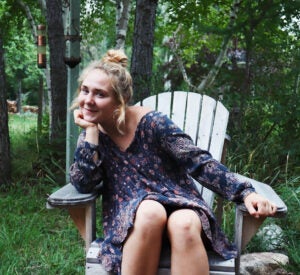Submissions for the Creative Non-Fiction category are open to one work of creative nonfiction completed for coursework in the last calendar year. Submissions should not exceed 20 pages. Abbey Nimegeers wrote the 1st place submission in the Creative Nonfiction Category for the 2023 President’s Writing Awards.
About Abbey

Hi! I’m Abbey Nimegeers and I am originally from Saskatchewan Canada. While I tell most people that Saskatchewan is the least interesting place in Canada, the truth is I attribute my grit, work ethic, and ability to see beauty everywhere, to my childhood on the prairies. I fell in love with Idaho when I was 16 and knew this is where I wanted to go for university. My major is in Writing, Rhetoric, and Tech Comm, with hopes of opening my own freelancing business in the future. When I am not studying I am usually skiing, hiking, fishing, or taking photos. Thank-you for taking the time to read my work!
Winning Manuscript – Smoke Signals
Five acres of unruly garden sounds like it should shimmer green, and against the otherwise bald prairies, it did. But the dullness of dirt and ash and sun-burnt thistle is what those who spoke the language of the land would remember for color.
Fire pits dotted my acreage growing up. There weren’t landscape crews with tools and trucks fighting the overgrown trees and the arctic thistle in the garden, there was my mom, her calloused hands, and her fire pits.
The first fire pit created on that property is where the bones of my family remain. A burnt-orange brick, and ash-speckled patio large enough to hold 20+ chairs, at least 4 guitars, coolers of cheap beer, no less than 3 chaotic dogs, countless feral cats, and some big personalities, — the blueprints for a timeless fire pit. This was the pit closest to the house. In the old film photos of my mother and my sisters and I playing in the mud of the spring, you can see the edge of that patio being built. Elm saplings and baby serviceberry bushes dot the back, almost looking out of place in the otherwise barren field. Despite all the chaos and beers of a family gathering on a summer night, that pit served more days as a chapel for my mother than it did as an entertaining space.
Those baby trees grew as I did. When I was four or five, I would play on the swing set 100 yards from that pit while my mother poked and sauntered around it, planting bulbs and expelling thistle, or sketching mermaids and dragons as she sat in the heat of the flames. Every time I reached the highest point of the swing set’s pendulum, I would yell “hi mom!!!” and wave, over and over again. By the time I was nine I no longer waved, I just yelled, as the trees blocked the view of her. I only knew she was there because of the smoke that drifted high above any trees.
The second pit didn’t come into existence until I was in middle school, when she broke new ground two acres back on the property and needed a fire pit closer to her freshly pulled thistle. It was right in the middle of the apple tree garden where we would throw rotten apples to the alpacas and chickens across the fence. If we didn’t know where she was, we could usually find her here. We’d yell out before we led friends back there, discreetly telling her to put a shirt on, or at least a bikini top.
After she had lit a cigarette and moved inside to the fireplace in our living room, we would march out there with our friends, a case of beer, and our bad intentions. She eventually put out a garbage bin for the beer cans, which seemed like an invitation at the time, but now feels more like a surrender.
The third fire pit was even farther back. There wasn’t much surrounding it but the treehouse my grandfather built, her estranged father, and the young aspens she had planted 15 years ago with my dad, her estranged husband. I don’t know why she chose this spot for the third; why she always moved away from what she had built. All I know is that it was rarely not smoking, and she was rarely far from it. Slowly, the rocks she used to guard the flames fell out of place and she retired to cigarette smoke and whisky tea in her bed. That’s where you could find her for the next three years. There was no more smoking fire, but all her clothes still smelled of it.
One summer when I returned from boarding school, I found her poking around that first fire pit, puffy eyed and cigarette lit, but right there; right where I left her 15 years before. The smoke smelled of hope to me that day. She looked alive again. Now looking back, I think she was saying goodbye.
My uncle wrote her eulogy. It went something like, “Like an old Cherokee woman, Pam knew when she was holding back the tribe, when it was time to walk into the flames.”
Now all that’s left is the smell of smoke, and a unruly garden full of thistle.